I was reading over an essay co-written by Dr. Robert Anda and Dr. Vincent Felitti. I found some quotes I love. They are simple, short and clear. They are all from this book, The Impact of Early Life Trauma on Health and Disease: The Hidden Epidemic.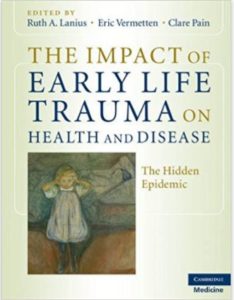
It was published in 2010 and is edited by Ruth Lanius, Eric Vermetten, and Clare Pain.
Here are just a few quotes.
ACEs Impact Health
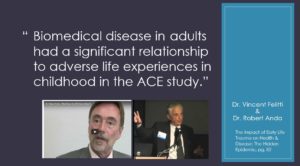
This seemingly obvious statement (left) was not obvious to all or always known. It is still not understood or believed to be true by many. What-the-what?
Despite DECADES of data and BOATLOADS of research to back up what many have always and intuitively known – this stuff is not common knowledge.
Children are not snakes who shed the past like skin when we turn 18. The past is carried in our bones, our blood and our ways of being. We are not doomed but we are shaped in ways that we have to acknowledge, understand and address.
We can heal, recover, protect ourselves, kids, and each other. We can prevent ACEs from being a horrible heirloom. But many of us need to learn that what we thought was parenting that protects and toughens our kids up to survive a harsh world is what might indeed endanger. I used to think I needed to get better at enduring danger instead of understanding I should learn to stalk safety, joy and play instead – and make it so that my daughter can have these for her whole life which will help her be healthier, happier and live longer.
More about the basics of ACEs for the lay person.
ACEs Impact Lifelong Health
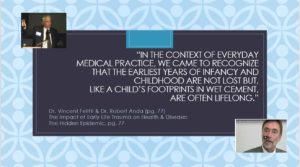
This point, also rather obvious, is proof that the impacts last and are not felt only during childhood.
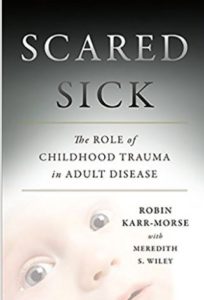
It is a little hard to believe that doctors doing health history and intakes with patients didn’t deduce this from forever ago. But, the medical model often looks at symptoms, and present issues, not cause and effect, prevention, or whole health.
More on this can be found in the book Scared Sick: The Role of Childhood Trauma in Adult Disease which is really good (though also not beach reading). It’s by Robin Kara-Morse and Meredith S. Wiley. It gets at the stats and the science but also the practical application and how it actually works in our lives. A quote I starred and underlined from Scared Sick when I read it the first time is:
“When our first love is erratic and unreliable or inseparable from pain, our expectations of other loves and our sense of self in relation to the other are likely to be skewed accordingly. This is the legacy of neglect or abuse and of insecure or anxious attachment the sense of trust in a relationship – and trigger troublesome genes that may activate diseases that might otherwise have remained dormant. The loss of secure attachment is the loss of our best protection against illness – our security blanket.” (pg. 147)
In the same book, on page 12, the authors quote Dr. Vincent Felitti. He said:
“Most physicians would far rather deal with traditional organic disease. Certainly, it is easier to do so, but that approach also leads to troubling treatment failure and to the frustration of expensive diagnostic quandaries where everything is ruled out but nothing is ruled in. We have limited ourselves to the smallest part of the problem-the part where we are comfortable as mere prescribers of medication. Which diagnostic choice shall we make? Who shall make it? and if not now, when?”
Medicating/Self-Medicating are Major Ways People/Prescribers Deal with ACEs
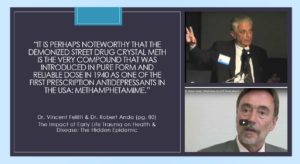
The ACE study has done a lot to help us think differently about addiction but also to understand how what we once thought of us as the self-destructive behaviors causing long-term symptoms in adults after childhood issues, are often, ways to regulate, soothe, survive traumatic stress.
Many of us have seen the shocking stat that cites a “boy with an ACE score of 6 has a 4,600 percent increase in the likelihood of abusing intravenous drugs later,” (pg. 11).
But it’s not just “street drugs” which are common to those of us with high ACEs but also pharmaceuticals.
Consider this: Of those in the ACE study, 9 out of 10 people with an ACE score over 6 have been prescribed anti-depressant/anti-anxiety medications. That’s almost all of us. That means, that for the 17,000 people in the ACE study, the range of approaches by doctors with lots of education and degrees was remarkably predictable and consistent. It did not vary tons.
I don’t know what the rate of prescriptions is for the same drugs for those with ACE scores of 5 or less, but I’m guessing it’s a lot less.
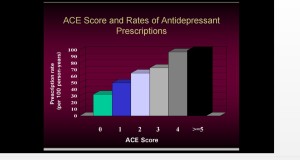
Those with lots of childhood adversity, are often turning to drugs and self-soothing/self-regulating approaches and that’s true whether we are on a DIY coping plan or have insurance and access to doctors.
Medical management of moods is often via drugs, in or outside of traditional settings and so those of us without degrees, high income, and expertise in the field of medicine are often doing exactly the same as doctors.
It makes sense to me when we understand how many of us with ACE have trouble with regulating the basics of being human.
- Sleeping
- Eating
- Relating
- Relieving ourselves
These are things that we can get support and assistance with as kids so we feel comfortable in ourselves, the world and with others. Or, if we have ACEs, these can all be made much more complex, tricky and difficult for us (i.e. bedwetting, eating disorders, relationship challenges, digestion stuff, insomnia, etc. etc.) as well as all the mood issues, etc.
ACEs Impact on Girls & Women
Women and girls are disproportionately impacted by early adversity.
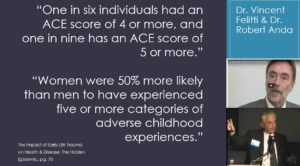
This was actually news to me and something that inspired five of us moms to launch the #FacesOfPTSD campaign a few years back.
Like many, we did not know that women are more than twice as likely to be diagnosed with post-traumatic stress, and most often from interpersonal violence, even though all five of us mamas had post-traumatic stress.
Like many, we thought PTSD was an issue that impacted mostly male veterans. That’s understandable given this is the image that one sees today if you Google PTSD.
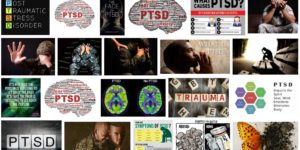
There are brains, boys, words, men and a butterfly. No girls. No women. And it’s not that mean and veterans do not get PTSD. They do and should be pictured. It’s just that one would never know from these images that civilians get PTSD, that women get it more than twice as often as men or that civilian men get PTSD and that female veterans get PTSD as well.
With ACEs, women are disproportionately impacted as well. This also seems like something all doctors should know or notice from their own experiences and practice. But, this too is often misunderstood. Well, except by survivors, feminists, and health activists who have often been saying just as much and insisting that the health issues of women be better researched, understood, and treated. We’ve also asked that the challenges unique to women in the childbearing years as relates to intimacy, sex, pregnancy, birth, breastfeeding and early parenting be better researched. Adoptive parents and fathers could benefit from research about how child adversity impacts sex, intimacy, family planning and parents as well as parenting.
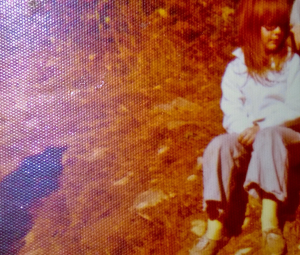
Luckily, we are about to get WAY MORE information and education. On Friday, Donna Jackson Nakazawa announced on her Facebook page that she is doing a three-part series which she writes about in a new blog post entitled “Female Adversity: The Female Body and Brain on Toxic Stress.”
She writes:
“I’m going to break down for you, in a way no one else has, or will, how and WHY Adverse Childhood Experiences and toxic childhood stress are a #metoo issue of the greatest magnitude. For girls and for the adult women they become.”
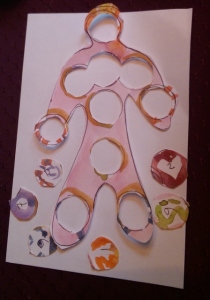
Art by Margaret Bellafiore
“Growing Up With Female Adversity: The Female Body and Brain on Toxic Stress. In it, I’m offering up the term — and hashtag — #FemaleAdversity — to refer to the chronic societal stress girls face growing up. Girls not only come of age with higher rates of #AdverseChildhoodExperiences, including verbal, emotional, sexual and physical abuse, girls also have to find their way to a healthy adulthood and sense of self amidst cripplingly narrow societal expectations regarding what is acceptable female beauty and behavior. All this is intensified, 24/7, by images of effortless female perfection on social media and in media in general. Meanwhile, girls are witnessing the sexual harassment and sexism so many adult women endure. Over time, this #FemaleAdversity can take a toll on girls’ and women’s immune systems, bodies, and brains in unique ways.”
Yes. Yes. Yes.
I know I sound like I must have been hired by her PR department, but nope, I’m just a super fan of this feminist, science writer who is an ACEs expert and who respects parents, survivors, women and men’s health issues and children and parents. That should be all researchers and writers and experts, right? But it’s not – not always or not yet, at least.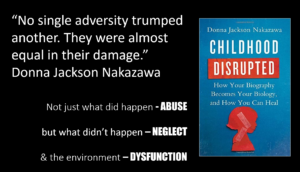
However, let’s keep learning all we can, sharing what we discover and making things better for everyone.
#ACEs
#FemaleAdversity
#AdverseChildhoodExperiences
#FacesOfPTSD
Note: this is part of the 30 posts after Oprah series. Days 1, 2, 3, 4, 5, 6, 7, 8, 9, 10, 11, 12, 13, 14, 15, 16. This post is 17, 18, 19 & 20 combined.
You Matter Mantras
- Trauma sucks. You don't.
- Write to express not to impress.
- It's not trauma informed if it's not informed by trauma survivors.
- Breathing isn't optional.
You Are Invited Too & To:
- Heal Write Now on Facebook
- Parenting with ACEs at the ACEsConectionNetwork
- The #FacesOfPTSD campaign.
- When I'm not post-traumatically pissed or stressed I try to Twitter, Instagram & Pinterest.
This made my whole day <3
"When I'm not post-traumatically pissed or stressed I try to…"